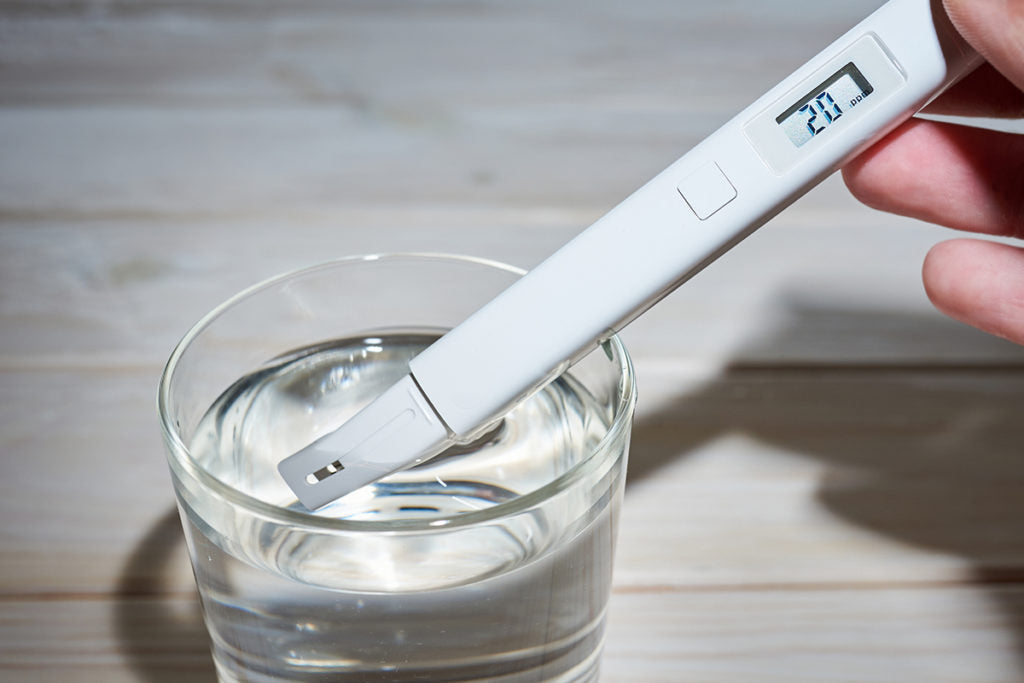What is a TDS Meter & Do You Need One? Myths vs. Facts

Are you thinking of investing in a high-quality water filter system for your home? Great! But do you know what’s in your drinking water, or how you can learn more about the tap water quality in your area? These are excellent questions that can help you determine which type of water filter is right for you. You may have started researching answers to these questions online, and you’ve likely come across recommendations to use a TDS meter to evaluate your water supply. That brings up even more questions: What is a TDS meter? What does a TDS meter measure? Do you need to rush out and get one?
The pros at WaterChef are here to help. We’ve been in the clean water business for over 35 years, and we care deeply about making sure your family is getting the purest, best-tasting water possible. Let’s dive into the details of what TDS stands for, how it does and does not relate to the quality of your drinking water, and what steps you can take to ensure the water coming from your home’s faucets is safe.
What Is a TDS Meter?
TDS stands for “total dissolved solids.” So, what does a TDS meter do? This small, hand-held device uses electrical conductivity to count the exact number of dissolved solids in liquid. What kinds of solids are we talking about here? The most common are ionic particles, like sodium, magnesium, and calcium. There may also be some dissolved solids from microscopic organic matter, such as plant material.
Where Does TDS Come From?
How do these solids get into your town or city’s water supply? It’s part of the natural process of water formation. As rain falls to the ground, it passes through rocks and soil, dissolving the naturally occurring minerals it encounters. Those dissolved minerals remain in the water at varying levels, and when certain mineral concentrations are high enough, the water is considered “hard.” Standards from the U.S. Geological Survey (USGS) classify water with 61-120 milligrams per liter (mg/L) of calcium carbonate as moderately hard; water with 121-180 mg/L as hard; and water with over 180 mg/L as very hard.
Hard water is not necessarily dangerous to drink, but according to the Water Quality Association, it can cause problems like scaly buildup in pipes and appliances, deposits on glassware, and difficulty getting clothes clean because hard water can’t properly mix with detergent.
Is Water with High TDS Dangerous to Drink?
It’s important to note that the level of TDS in water is not a good indicator of whether that water is safe to drink. The Environmental Protection Agency (EPA) has labeled these dissolved solids as secondary contaminants, which means they’re not considered a health threat. However, per EPA recommendations, drinking water should have a TDS level of under 500 mg/L, as levels higher than that can result in issues such as unpleasant taste.
Interestingly, having some TDS in your drinking water can be a good thing, since TDS can include healthy minerals like calcium and magnesium. In addition, TDS can affect water’s taste for the better. In fact, the World Health Organization (WHO) brought together a panel of tasters who determined that having some TDS in water actually improves its flavor; it turns out that eliminating all TDS can leave water tasting “funny.”
Does a TDS Meter Measure Common Water Contaminants?
The short answer is no. While you need to know a few things before choosing the best home water filter for your family, the number of total dissolved solids ranks relatively low in importance. Using a TDS meter may help confirm whether you have hard water (although you can have high TDS without having hard water), but it won’t indicate your water’s safety. That’s because a TDS meter does not differentiate between levels of dangerous contaminants vs. healthy dissolved minerals. A TDS meter may fail to measure common water contaminants such as:
- Ammonia
- Arsenic
- Bacteria and Viruses
- Cadmium
- Chromium
- Lead
- Nitrates
- Mercury
- Cysts
These contaminants may be in your water — even if it looks, smells, and tastes just fine, and even if your TDS meter doesn’t indicate high TDS levels.
Why Do Some Companies Promote Using a TDS Meter?
Because TDS meters are relatively cheap and easy to use, many companies recommend them and mislead homeowners into believing they indicate a need for a home filtration system. Some of these companies have even been sued over their false or misleading claims. Keep in mind that their goal is not necessarily to protect your family from unsafe drinking water, but to increase sales and attract new customers.
How Can I Get Accurate Information About My Home’s Drinking Water?
If you’re considering a water filtration system, you need as much information as possible about your home’s drinking water. Start by getting a Consumer Confidence Report from your municipality or other water provider. The EPA requires every community water provider to make these reports accessible to its customers. This report can give you valuable insights into your water quality, including possible sources of contaminants. You might also consider getting your water tested by your local municipality.

How Can I Be Sure My Water Filter Removes Unhealthy Contaminants?
It’s difficult to know whether claims made by water filter companies are true because there isn’t much federal regulation when it comes to home water filtration systems. One way to be sure your water filtration system is doing what its manufacturer says it does is to look for independent NSF/ANSI certification by organizations such as IAPMO, WQA, and NSF International. Why does it matter? Because the National Sanitation Foundation (NSF) and American National Standards Institute (ANSI) are nonprofit organizations that develop standards regarding the safety of food, animal feed, and of course, water.
All WaterChef water filter systems and replacement cartridges are independently NSF/ANSI certified, and our drinking water filtration systems provide superior reduction of common contaminants while allowing beneficial minerals to remain. Whether it’s coming from your refrigerator filter, your under-sink or countertop system, or your shower, you can feel good about the water your family uses with rigorously tested and certified WaterChef water filtration products.


















